Fataawaa
Fataawaa

In the Name of Allâh, the Most Beneficent, the Most Merciful
Lexically, the Arabic word fatwa means to give a satisfactory answer regarding a certain issue. In the technical language of Shari`ah, the word fatwa clarifies the Islamic ruling in an answer given to question or a set of questions usually related to an Islamic issue. It does not make any difference whether the questioner is a person or a group of persons. Ibn Taymiyyah Expounds on Islam

This is the english book "Ibn Tamiyyah Expounds on Islam" - A book of various fataawaa on Islamic faith, life and society. Translated by Muhammad Abdul Haqq Ansari and printed by The Institute of Islamic and Arabic Sciences in America (IIASA).
- Download [61 MB - Right click and save target as]
The Ruling on Meat Slaughtered In the West
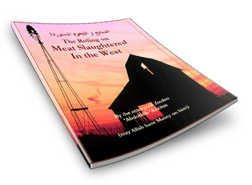
By Abdullah Azzam. “…During my visits to the West, and when I am being served meals on planes or in restaurants in Europe or America, I would find that I was very hesitant to eat the food, and I wanted very much to search for halal food and find that pure bite to eat in order to protect any part of my flesh from being nourished on haram, as the Fire is more deserving of every bit of flesh nourished on the haram…”
Courtesy of Iskandrani
Fataawa (Rulings) Concerning Tobacco Cigarettes
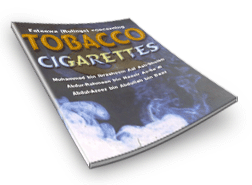
The colossal devastation of human health cause by tobacco use and smoking in the recent centuries cannot be denied by any sensible person. It is the single largest preventable cause of death all over the world causing unmentionable suffering and millions of debts yearly, yet even today the multinational tobacco corporations refuse to accept the conclusive scientific evidence and continue to selfishly promote their multi billion dollar industry often among those ignorant to the far reaching hazards and health consequences. The Islamic legal judgements of some of the most eminent scholars – Jurists of our era, - the use and promotion of all tobacco products is strictly prohibited (haram) and juristically punishable according to Islamic Law and legal precepts. The lucid, intelligent and legally sound arguments presented countered the feeble claim that tobacco use is merely obnoxious (Makrooh) and therefore a lesser social evil to be tolerated society.
The Islamic Ruling on Music and Singing
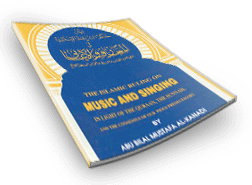
By Abu Bilaal Mustafa al-Kanadi. The legality of music and singing in the Islamic shari'ah (the divinely-revealed law) is an issue which is hotly debated among individuals and scholars in Islamic societies of our present day. Arriving at the correct view requires unbiased, scholarly research of the available literature which must be supported by authentic, decisive proof. A considerable amount has been said and written both for and against this subject, and the proliferation of doubt and confusion necessitates another more critical, meticulous analysis and assessment of this whole matter, in order for one to come to a clear, decisive conclusion which leaves not the least bit of doubt in the mind of the reader.
The Nature of Fasting

By: Shaykh al-Islam Ibn Taymiyyah
This is a translation one of the smaller publications from the works of Shaykh Al-Islam Taqiuddin Ahmad bin 'Abdul-Halim Ibn Taymiyyah. It has been published in this form a variety of times with a number of minor additions to the text under the title, "Hagigatus-Siyam," or, "The Nature of Fasting." We have revised our version to meet the source section of Majmu' AI-Fatawa (25:219) from where it appears that the original booklet - with the exception of the questions, of which most appear on earlier pages - has been taken. We have inserted brackets to signify the additions, which earlier publishers probably took from other sections of his writings. We have also added brief references to the text for the Hadiths. I would like to express gratitude to brother Ebrahim Aly Ma'rouf for the original translation of this booklet, and the Darussalam staff for their editing and layout work.
Ruling on Magic and Fortunetelling

By: Shaykh Bin Baz. A short treaty written on the danger getting involved with those who practice magic.
Non-Muslim Religious Celebrations & Ruling On Part Participating
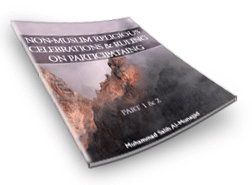
By: Taken from the introduction: The conflict between truth and falsehood is ongoing and will last as long as this world remains. The fact that some groups among the Ummah of Muhammad (peace and blessings of Allaah be upon him) are following the people of falsehood such as the Jews, Christians, Zoroastrians, idol-worshippers and others, whilst a group is remaining steadfast to the truth despite the pressures, is all part of the decreed system of the universe. But this does not mean that we should give in and follow the ways of those who are astray, because the one who told us that this would inevitably happen also warned us against following this path, and he commanded us to adhere firmly to Islam no matter how many people deviate from it and no matter how strong they become. He told us that the blessed one is the one who adheres steadfastly to the truth no matter what the distractions, at a time when the one who does righteous deeds will earn the reward of fifty men whose deeds are like those of the Sahaabah (may Allaah be pleased with them) – as was reported in the hadeeth of Abu Tha’labah al-Khushani (may Allaah be pleased with him).
Celebrating Valentine’s Day
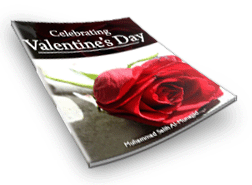
By: A book by Sheikh Muhammed Salih Al-Munajjid focusing on the history of valentines day and the permisibility of muslims celebrating it.
Rulings of Udhiyah Sacrifice
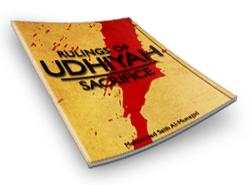
By: Udhiyah refers to the animal (camel, cattle or sheep) that is sacrificed as an act of worship to Allaah, in the country in which the person offering the sacrifice lives, during the period from after the Eid prayer on the Day of Nahr (Eid al-Adhaa) until the last of the Days of Tashreeq (the 13 th day of Dhu’l-Hijjah), with the intention of offering sacrifice. Udhiyah is one of the great rituals of Islam, in which we remember the Unity of Allaah, His blessings upon us and the obedience of our father Ibraaheem to his Lord, and in this act of udhiyah there is much goodness and blessing. So the Muslim must pay attention to its great importance. This book is a brief look at this important ritual.
Stunning Fatwa

It has now been established through scientific research as well that the practice of making animals unconscious before slaughtering, as carried out in western countries, is more painful for the animal. Therefore, it is necessary for Muslims to make every effort to obtain exemption from this practice.
Mufti Muhammad Taqi Usmani
Darul Ifta Jamia Darul Uloom Karachi
26/03/1426 AH
It is Haram to stun an animal by striking it or giving it an electric shock etc. because that causes suffering to the animal and the Prophet (peace and blessings of Allah be upon him) forbade causing suffering and tormenting them, and he enjoined kindness and goodness in general terms, and with regard to slaughter in particular. Muslim narrated from Ibn ‘Abbas (may Allah be pleased with him) that the Prophet (peace and blessings of Allah be upon him) said: “Do not take anything in which there is a soul as a target.” And Muslim narrated that Jabir ibn ‘Abd-Allah (may Allah be pleased with him) said: The Messenger of Allah (peace and blessings of Allah be upon him) forbade tormenting any kind of animal to death. Muslim also narrated from Shaddad ibn ‘Aws (may Allah be pleased with him) that the Prophet (peace and blessings of Allah be upon him) said: “Allah has decreed kindness (or proficiency) in all things. So when you kill, kill well, and when you slaughter, slaughter well. Let one of you sharpen his blade and spare suffering to the animal he slaughters.”
Fataawa al-Lajnah al-‘Daa’imah, 22/456-457. (www.islam-qa.com)
Halal Monitoring Committee | HMC Approved Butchers (uK) | HMC Approved Restaurants & Takeaways (uK) |
 Fatwa,
Islamic Books,
Islamic Teachings,
Kalamullah
Fatwa,
Islamic Books,
Islamic Teachings,
Kalamullah
This entry was posted on Sunday, October 18, 2009 , 6:14 AM. You can follow any responses to this entry through the RSS 2.0 feed. or you can leave your own response below.

 or
or 







